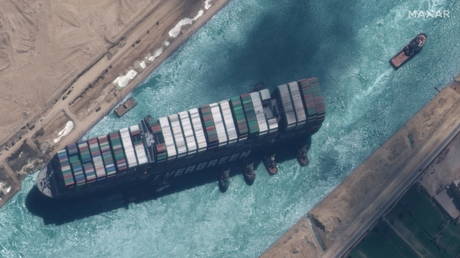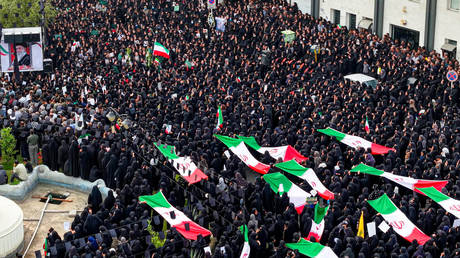
An April Fool’s story in the Guardian claiming that there were plans to construct an alternative to the Suez Canal was picked up by the BBC’s Turkish service, which deleted its report after realizing it had been duped.
The Guardian ran a tongue-in-cheek article on April 1 which stated that UN officials wanted to create a new waterway, dubbed “Suez 2”, that would run along the Egypt-Israel border. According to the British outlet, the idea was hatched after the Ever Given container ship beached, blocking the Suez Canal for a week.
A fake statement (that wasn’t) provided by the UK Foreign Office said that Britain was aware of the plan and was ready to play a leading role in any project that would help the region “build back better,” a slogan adopted by Prime Minister Boris Johnson and other world leaders to plug their post-pandemic economic recovery initiatives.
A fictitious official told the paper that the UK government had expertise in such infrastructure projects and could even “share our preliminary designs for the proposed tunnel links to Northern Ireland.”
The article goes on to claim that an alternative route that would recreate the “ancient passage to the Nile from the Red Sea” was also being considered. However, this plan was less practical because the river wouldn’t be deep enough to accommodate large container ships. When water levels in the Nile drop, camel trains could be on standby to lug cargo, the Guardian reported.
Despite its numerous cheeky claims, and being published under the outlet’s “April fools” category, Turkish media took the Guardian story at face value. Hurriyet, as well as several other local papers, published pieces about the make-believe infrastructure initiative.
The story also tricked the BBC’s Turkish service, which ran the headline: “Second Suez Canal project, UN is reviewing a second seaway.”
BBC Turkey even included extensive details and background about the rather difficult-to-believe Nile passage proposal.
“Another possibility that the UN is looking at is the revitalization of the ancient Pharaohs Canal that connects the Red Sea to the Nile. The canal, which was opened during the period of Persian Emperor Darius I, was closed in 769,” the BBC’s Turkish service expertly relayed.
The article was later scrubbed from their website, presumably after they were informed that “Suez 2” was entirely fictitious.
Ironically, the BBC ran a story in 2018 which accused Turkish media of being rife with fake news, allegedly due to sloppy reporting and a penchant for broadcasting wild conspiracies.
“Turkey is a country where fact and fiction are increasingly hard to distinguish, and where information is weaponized to further divide a profoundly polarized society,” the publicly-funded UK outlet wrote at the time.
Like this story? Share it with a friend!




